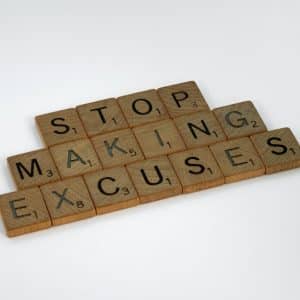Overcoming Stress… and our excuses not to exercise

Even if you’re unsure of the details, many of you know that exercise reduces our risk of serious infection by addressing co-morbidities (health conditions like diabetes and heart disease that make us more susceptible to complications from illness). For example, a balanced exercise routine improves how our body uses oxygen (i.e. “cardiorespiratory fitness”), balances blood sugar, and balances the immune system. Stress can also be a risk factor for illness, and exercise is a HUGE stress-relieving activity for many people. But it’s a bit of a catch-22 if stress also inhibits your ability or willingness to exercise.
Overcoming Our Excuses
I have many excuses for not exercising. Maybe you do too. Some of these we could overcome with a bit of will power, but some excuses reflect significant health concerns or outdated beliefs. Here are my top 3 Obstacles to Exercise and workarounds that will hopefully help you get on track with an exercise plan again – or even for the first time.
Obstacles to Exercise:
Exercise Excuse 1: I’m too tired to start.
Exercising when you’re too tired isn’t always a good idea. Some people are surprised to hear me say this. If your fatigue is significant, you need to address this before you can ask your body to perform intense exercise. And though the underlying cause of fatigue goes well past the scope of this article (there are many reasons why the body enters “energy-conservation mode”), I still feel comfortable saying that regardless of the cause, movement in some form is an absolute must! Depending on your energy level and state of health, this could mean gentle stretches for 3 minutes a day combined with breathwork.
If you’re someone who sometimes gathers up enough energy to exercise and your energy level goes up after exercise, that’s good news! Sometimes this tells us that your body needs more circulation, and its time to explore things like water intake, iron or vitamin B12 deficiency, or slow thyroid function. Your MD or ND can help you out with this one if needed.
Exercise Excuse 2: I’m too tired after exercising and my whole day is wasted.
I’ve met many frustrated patients who are motivated to exercise but who can’t afford the nap time afterward. It’s as though they’ve burned through all their stress hormone just moving through their day and don’t have enough to spare for exercise. In these cases, I find that a well chosen “adrenal support” with adaptogenic botanicals such as Eleuthrococcus, Cordyceps, and Astragalus, really helps! These age-old botanicals support stress hormone balance in the body and help us slowly get back on our feet again. (There are dozens to choose from, each with possible side-effects and drug interactions, so please speak to someone knowledgeable before starting a new supplement.)
Exercise Excuse 3: 50 minutes three times a week (which is what most Public Health agencies call for), is impossible to fit into my schedule.
I agree. I find that even when I creatively incorporate some responsibilities like housework or kids into my exercise regime, I still end up swapping out my exercise time for other work or life priorities. That’s why I was so happy to come across this free online course by two McMaster University professors who explain how a well-designed workout with only 1 minute of intense exercise enjoyed only 3 times a week, can be fairly equivalent to the health benefits achieved by 150 minutes of exercise a week. Better yet, you can design your own regime to be done at home and with no equipment. Very practical! (That 1-minute is divided by short intervals of low intensity exercise, and that routine is sandwiched between a warm-up and cool-down time, for a total of perhaps 10 minutes, ideally done 3 times a week.)
The free online course is called “Hacking Exercise for Health”. It’s a simple, entertaining, beginner-level course that is relevant for most any adult, including people with stable heart concerns and elderly individuals. I quite enjoyed it, but if courses aren’t your thing, you could try reading the book written by one of the course instructors, Martin Gibala: The One-Minute Workout.
There are a myriad of reasons to exercise, but stress management and health resiliency are some critical ones we can’t afford to overlook right now. If you’re starting out with a routine for the first time, know that this is where we achieve the biggest health gains! (The health benefits of longer and more intense exercise regimes offer incrementally smaller health benefits, compared to moving regularly for the first time.) And you don’t have to push yourself too hard to see these health gains. Stick within your limits, and stick to it for 3 weeks, and then let us know how much better you feel!
Do you have a personal story to share about how you finally got over the hump to start exercising and then found it entirely worth it?! I’d love to post those inspiring stories in our next newsletter (anonymous if you’d like!). Just send me an email.